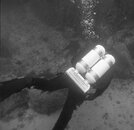I keep reading this claim ... but some of the old fogeys I've dived with haven't turned out to be very good divers ... especially if you were expecting them to be a dive buddy…
In general, divers were trained to be much more self-sufficient than buddy dependent then. Scuba 101 was on the order of 6 classroom sessions about 2 hours each, 6 pool sessions, and 6 days of diving usually including snorkeling/freediving and two tanks per day. Self-sufficiency training included real swim tests without gear, freediving (snorkeling), free ascents, mild harassment dives, buddy breathing, and sometimes bare-valve breathing. That instilled a lot of self-confidence that made panic a pretty rare event.
Physics and physiology training was also much more rigorous. It included decompression diving with repeds, “estimating” air supplies before SPGs were common, learning and applying all the gas laws by name, and pretty blunt language on the personal cost of making an error. Oxygen toxicity (pre-O
2 clock), practical effects of partial pressure (pre-Nitrox but touching on HeO
2), pretty complete coverage of all phases of Nitrogen Narcosis, recompression treatment, and a fair dabbling of history for perspective.
Many of us also learned about pure O
2 rebreathers. Buoyancy and Archimedes principal were covered for really basic salvage as well as dealing with not having a BC. Trim was something that divers worked out on their own if they weren’t comfortable and “leaving only bubbles” was a concept that was 30-40 years in the future. Everyone saw the inside of regulators and understood how they work, practiced basic rescue skills, and learned a lot about coastal currents since very few divers had the luxury of a boat.
All this resulted in a much greater tendency to become a same-ocean buddy or solo diver, especially on the West Coast of the US where kelp and lower vis is a factor compared to Florida. Diving on the Northeast Coast of the US was relatively retarded in these early days due to thermal protection limits and less predictable seas. You had to be relatively hard-core, had far fewer diveable days, and often needed a boat for the BIG diving asset… wrecks.
So, were divers better trained when classes were much longer and equipment was not nearly as helpful? Sure in many ways, especially panic resistance. Do they have the same sensibilities of diver today? Not unless they developed them along the way. Were they fundamentally better? Hell no, given similar training time and rigor — with the possible exception of the average age entering the sport.
There is much more opportunity for additional dive training now. In fact, the only options then were join the Navy and hope you get accepted into a diving program or sign up for a commercial diving school. The problem now is the great majority of divers don’t get any additional training past OW. It is common for them to have horrible buoyancy skills because far too many instructors grossly overweight them and don’t teach the basic principal. On average, new OW divers don’t swim very well and have very little confidence in their skills.
So what is a reasonable comparison today? I think it is fair to say ATBE, more academic and practical training is “better” than less. Put those same people in an integrated course that combined OW, AOL, Nitrox, Decompression Procedures, Rescue, and enforce a no-gear swimming test and you produce better divers than the ones turned out 35+ years ago… on average.





